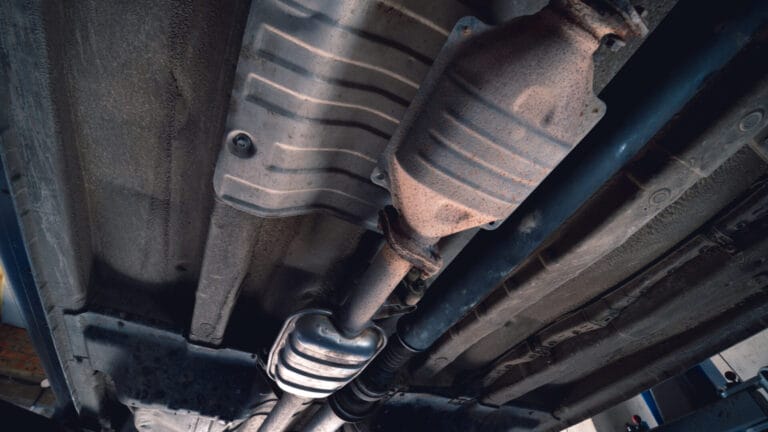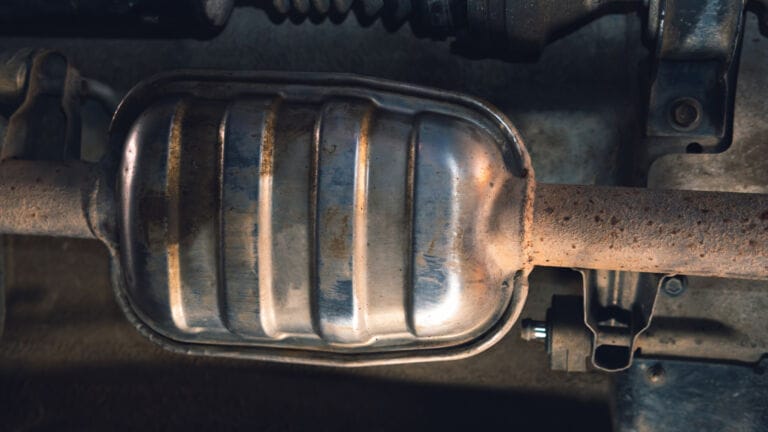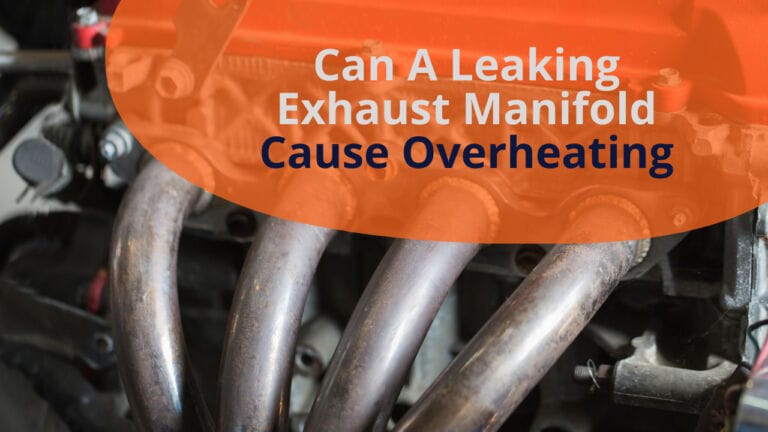Can Exhaust Leak Cause Bad Gas Mileage? Find Out Now!
Are you noticing a sudden drop in your car’s gas mileage? Are you looking for answers on what could be causing this? Look no further. One of the reasons for bad gas mileage could be an exhaust leak. What? Can exhaust leak cause bad gas mileage?
Yes, it can. The exhaust system highly influences your car’s performance, from reducing noise to keeping emissions under control.
So, any issues with the exhaust system can have a direct impact on your car’s fuel efficiency and even pose safety hazards. How? Want to know in detail?
Then scroll down and explore how exhaust leaks can cause bad gas mileage, how to identify a leak, and their impact on fuel consumption. We have also listed common signs of an exhaust leak and tips for maintaining good fuel efficiency.
Understanding Your Car’s Exhaust System
Before delving into the details, it’s important to have a clear understanding of your car’s exhaust system.
What Is Exhaust System
The exhaust system is an integral part of your vehicle.

It is a silent powerhouse, contributing to the overall health and performance of your vehicle. It helps maintain a proper fuel ratio (14.7:1) for the engine through the fuel filter, ensuring efficient combustion. This balance is essential for fuel economy and optimized engine performance.
The Exhaust system consists of various components, including the exhaust manifold, exhaust valve, catalytic converter, muffler, and tailpipe.
How Exhaust System Works?
When the engine burns fuel, it produces exhaust gas; exhaust manifold collects these gases from each cylinder. These gases then flow through the system, passing through components such as exhaust pipe, oxygen sensors, catalytic converters, resonators, and mufflers, each serving specific functions.
The oxygen sensors monitor and optimize the air-fuel mixture, enabling the engine to adjust fuel consumption for optimal performance and fuel efficiency. Next, catalytic converter transforms harmful emissions into less toxic substances, and resonators and mufflers reduce noise.
Finally, the tailpipe releases the now-tamed gases into the atmosphere. This orchestrated process isn’t just about quieting your car; a properly working exhaust system contributes to fuel efficiency, reduces engine noise, and ensures the safe elimination of dangerous gases produced during combustion.
Can Exhaust Leak Cause Bad Gas Mileage
Yes, an exhaust leak can cause bad gas mileage.
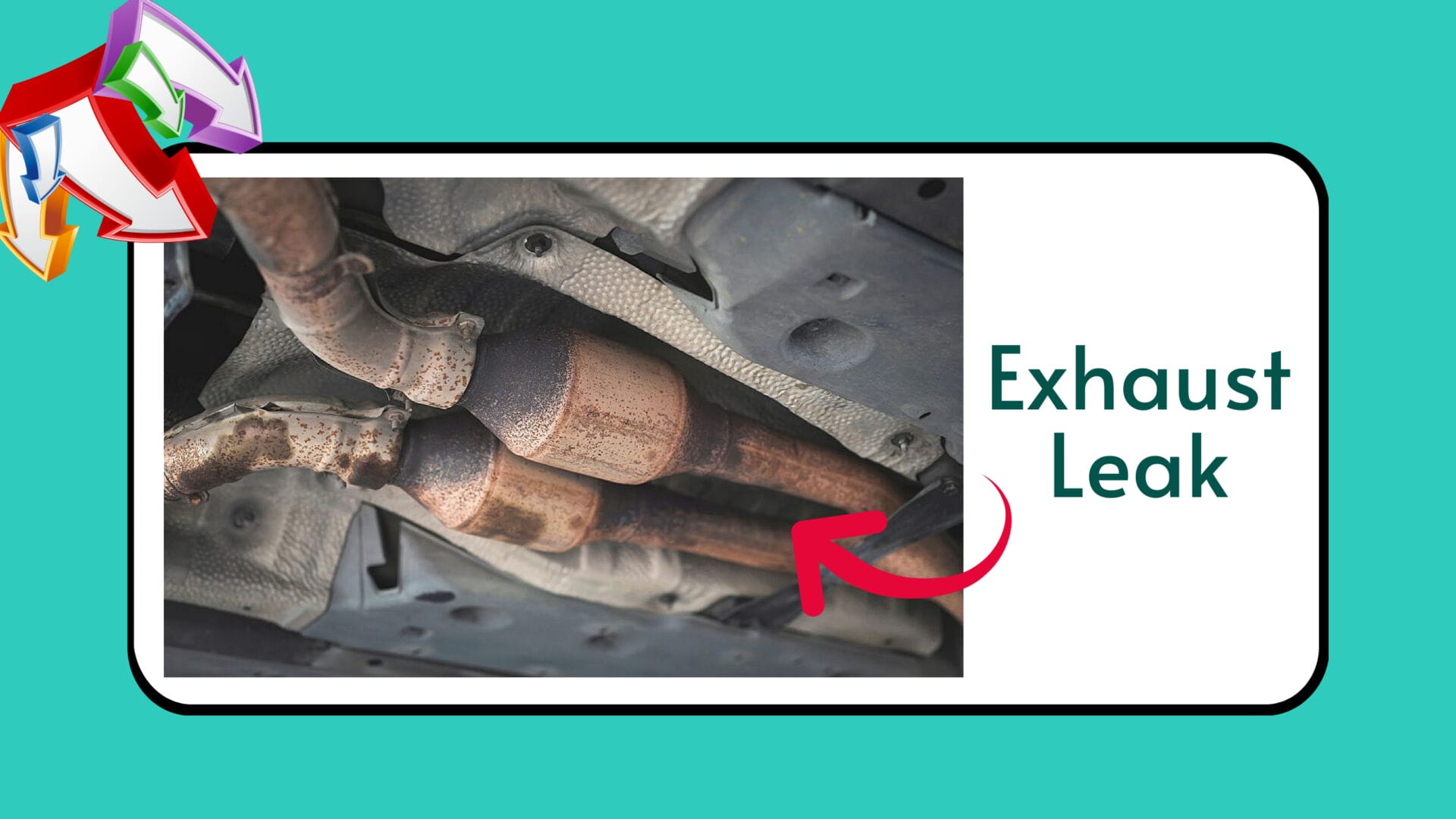
How?
When there is a leak in the exhaust system, there is gap available that allows fresh air to enter the system. This will disrupt the air fuel balance and require more fuel to make up for it. Additionally, if somehow the leak is located near the oxygen sensor, it doubles the problem. The oxygen sensor will send incorrect data to the ECM, and depending on this data, engine will use more fuel than necessary. Backpressure issues caused by exhaust leaks can also affect fuel consumption.
It’s important to address any issues with your car’s exhaust system regularly to ensure that the air-fuel mixture is balanced and that your gas pedal operates efficiently. Ignoring exhaust stream can lead to a ton of problems, from loss of power to decreased fuel efficiency.
Identifying an Exhaust Leak
Common Signs of Exhaust Leak
Identifying an exhaust leak is crucial for maintaining your car’s performance and safety. Here are key signs to watch out for:
Listen for Unusual Noises:
Start your car and listen for any hissing, popping, or rumbling sounds coming from the engine or the exhaust system. Use a mechanic’s stethoscope or a length of hose as a makeshift listening device to pinpoint the source of the noise.
Perform a Visual Inspection:
With the engine off, visually inspect the exhaust system components, including the exhaust manifold, pipes, and joints. Look for visible signs of damage, rust, or small leak or holes. Pay attention to any dark sooty areas, which could indicate a leak point.

Check Around Exhaust Joints:
Inspect the connections between exhaust components, such as where pipes meet the manifold or the catalytic converter. Look for signs of rust, corrosion, or gaps in these connections.
Feel for Air Leaks:
Use your hands around the exhaust system while the engine is running (when cool to the touch) to feel for any escaping air. Be cautious of hot components to avoid burns.
Use a Soapy Water Solution:
Mix a solution of dish soap and water and apply it to suspected leak areas of the exhaust system. Run the engine, if bubbles are shown anywhere in the exhaust system, that is the leaked location where the air is escaping.
Inspect Exhaust Smoke:
On a cold start, observe the exhaust fumes. A continuous stream of white smoke, particularly accompanied by a sweet smell, indicates a coolant leak, often associated with a damaged head gasket or crack in the exhaust manifold.
Check for Vibrations:
Feel for excessive vibrations felt through the steering wheel, floorboard, or pedals while driving, especially during acceleration. A leak may be the cause of vibrations that indicate irregular exhaust flow.
Bad/ Odor:
If you notice a strong smell of exhaust inside the cabin, it could suggest an exhaust leak. Take note, especially when idling or at low speeds.
Decreased Performance:
A drop in overall engine performance, including reduced power or acceleration, may be a symptom of an exhaust leak affecting the engine’s efficiency. A loud rumble or the illumination of the check engine light could be indicative of a potential exhaust leak.
Monitor Fuel Efficiency:
Keep an eye on your vehicle’s fuel efficiency. A sudden decrease in mileage could be a sign of an exhaust leak affecting the engine’s performance.
If you notice any of these signs, it’s advisable to have your vehicle inspected by a qualified mechanic. Early detection and repair of exhaust leaks are essential for maintaining the efficiency of your vehicle and safety on the road.
Causes behind Exhaust Leaks
Exhaust manifold leak can occur due to various reasons, and identifying the root cause is essential for effective repairs.
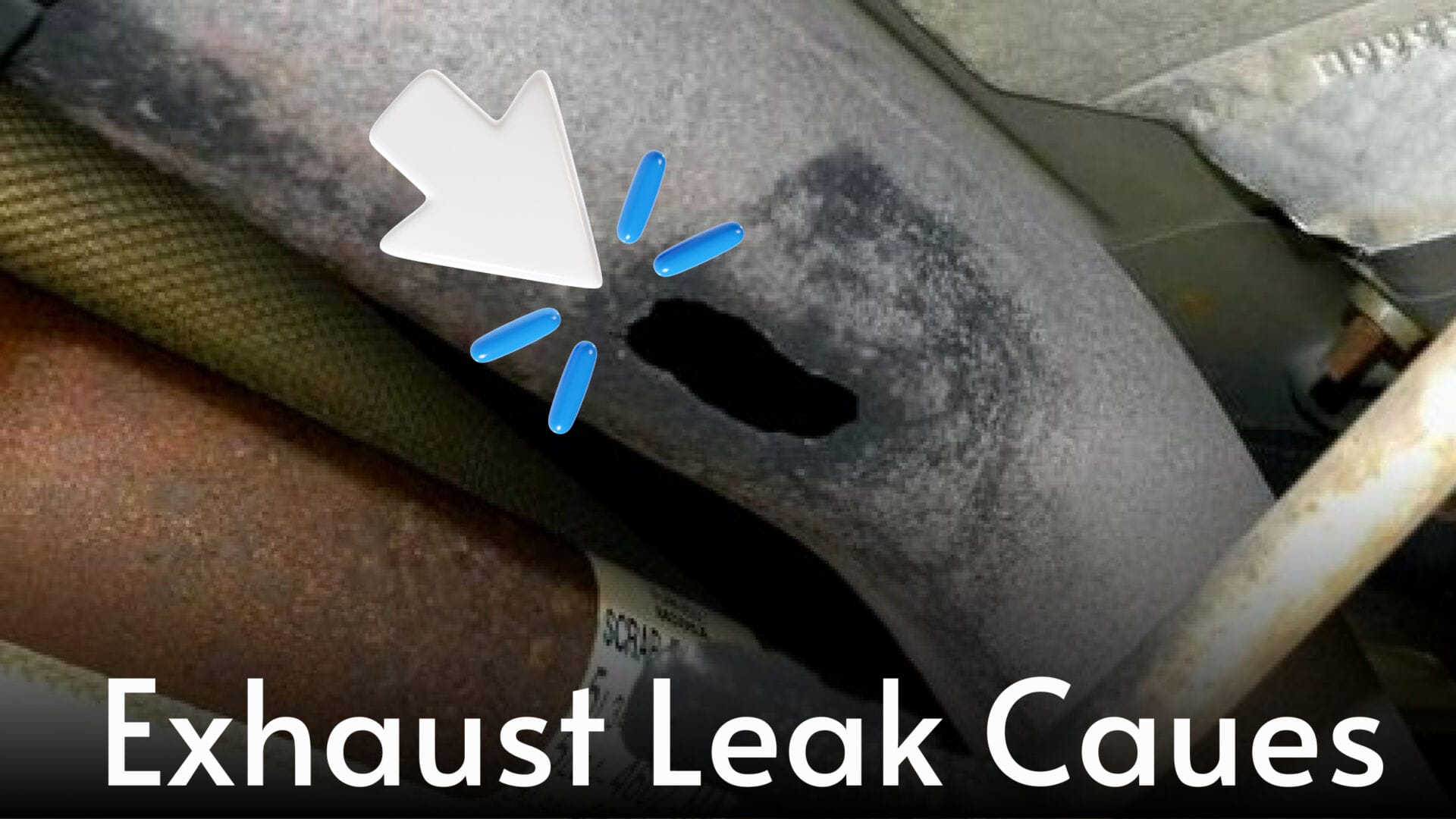
Here are common causes behind exhaust leaks:
1.Corrosion and Rust:
Over time, exposure to moisture, road salt, and other environmental factors can lead to corrosion and rust on exhaust system components, causing weakened spots and eventual leaks.
2. Damaged Gaskets:
Gaskets, which seal the joints between exhaust components, can deteriorate or become damaged over time. This often happens with the exhaust manifold gasket, causing leaks at the connection points.
3. Cracked or Broken Pipes:
Exhaust pipes are susceptible to physical damage, such as impacts from road debris or objects. Cracks or breaks in the pipes can result in leaks.
4. Faulty Seals:
Seals within components like the catalytic converter or muffler can degrade, leading to leaks. Check for signs of soot or residue around these areas.
5. Loose or Broken Hangers:
Exhaust system hangers support and secure the components under the vehicle. If these hangers become loose or break, it can cause misalignment, leading to leaks.
6. Worn or Cracked Manifold:
The exhaust manifold, collecting gases from engine cylinders, can develop cracks or become warped over time, resulting in leaks.
7. Excessive Heat:
The extreme temperatures generated by the exhaust system can contribute to metal fatigue, leading to cracks or holes in the pipes and other components.
8. Vibration and Movement:
Constant vibration and movement from the vehicle’s operation can accelerate wear and tear on exhaust system components, potentially causing leaks.
9. Poor Quality Components:
Using low-quality or aftermarket components that don’t meet the necessary standards may result in premature failure and leaks.
10. Accidents or Impact:
Collisions or impacts, even minor ones, can cause damage to the exhaust system, leading to leaks. It’s important to inspect the system after accidents.
Regular inspections, timely car maintenance, and addressing issues promptly can help prevent many of these causes and extend the life of your vehicle’s exhaust system. If you suspect an exhaust leak, it’s advisable to consult with a qualified mechanic for a through inspection and necessary repairs.
Problems Exhaust Leaks Can Cause
While an exhaust leak may not appear to be a significant issue, it can pose various dangers if left untreated. It can compromise both passenger safety and the environment. Let’s know in detail.
1. Carbon Monoxide Poisoning:
Carbon monoxide (CO) is a silent but deadly gas emitted by vehicle exhaust. An exhaust leak allows these colorless, odorless exhaust gasses to enter the vehicle’s cabin, posing a severe health risk. Breathing in elevated levels of carbon monoxide can lead to symptoms like dizziness, headaches, nausea, and fatigue. In extreme cases, prolonged exposure may result in loss of consciousness or even death.

2. Passenger Health Risks:
Beyond carbon monoxide, other toxic substances present in exhaust gases can also enter the vehicle cabin through leaks. Prolonged exposure may contribute to respiratory issues, aggravate existing health conditions, and compromise the well-being of vehicle occupants.
3. Environmental Impact:
Exhaust leaks not only pose a threat to human health and safety but also have a significant impact on the environment. Leaking exhaust gases contain harmful pollutants, such as nitrogen oxides and particulate matter, which contribute to air pollution. These emissions can worsen air quality, leading to respiratory issues and other health problems, especially for those living in highly polluted areas.
4. Failed Emissions Inspections:
In many regions, vehicles are required to undergo emissions inspections to ensure they meet regulatory standards. Exhaust leaks can lead to failing these inspections, resulting in legal consequences and fines. Addressing leaks not only keeps your vehicle compliant but also supports broader efforts to control noxious fumes and protect the environment.
5. Long-Term Engine Damage:
Beyond safety and environmental concerns, untreated exhaust leaks can lead to long-term damage to the engine and other components. Increased backpressure, improper fuel-air mixtures, and elevated temperatures can impact engine performance, potentially resulting in costly repairs if not addressed promptly.
In summary, an exhaust leak is not just a minor inconvenience; it poses serious dangers to both occupants and the environment. Timely detection and proper repair of these leaks are critical for safeguarding passenger health, maintaining compliance with emissions standards, and contributing to a cleaner, safer driving experience for everyone.
Some Other Culprits Behind Poor Gas Mileage
Exhaust leak isn’t the only culprit behind this; several factors can contribute to bad gas mileage in a vehicle. Identifying and addressing these culprits can help improve fuel efficiency. Here are some common factors:
- Aggressive driving, rapid acceleration, and frequent braking can significantly reduce fuel efficiency.
- Tires with low-pressure increase rolling resistance, requiring more fuel to maintain speed.
- A clogged or dirty air filter restricts airflow to the engine, affecting combustion efficiency.
- Misaligned wheels can cause uneven tire wear and increased rolling resistance
- Malfunctions in the intake manifold (produce unburnt fuel) fuel injectors, fuel pumps, or fuel pressure regulators can disrupt the proper delivery of fuel to the engine, resulting in reduced efficiency.
- Issues with the ignition system, spark plug, or downstream sensor
- Carrying unnecessary weight in the vehicle, such as unused items or roof racks
- Extended idling consumes fuel without covering any distance
- Low-quality or contaminated fuel can affect combustion and engine performance
- Open windows, rooftop carriers, and other external accessories can increase aerodynamic drag, reducing fuel efficiency.
- Wrong type of engine oil can increase friction and reduce engine efficiency
- Problems with the transmission, such as slipping or delayed shifting
Identifying and addressing these factors and fixing them can help you get rid of this bad fuel mileage problem.
Tips For Better Fuel Efficiency

- Maintain a steady speed and avoid abrupt changes in driving behavior
- Remove excess weight to improve gas mileage.
- Stick to recommended fuel grades and sources. Make sure to oil change in time.
- Minimize idle time and turn off the engine when parked
- Don’t forget to align the wheels in time
- Check and clean the air filter as recommended if it is clogged.
- Ensure proper tire pressure to optimize fuel efficiency.
In essence, regular maintenance is essential to keep the vehicle in good condition, and when the vehicle’s health is good, you will get better mileage.
FAQ
Does A New Exhaust Improve Gas Mileage?
If your current exhaust system is damaged or restrictive, upgrading to a high-quality aftermarket exhaust will lead to marginal improvements.
A new exhaust system will enhance overall engine performance, provide a more efficient flow of exhaust gases, and improve gas mileage for most modern vehicles. Factors such as engine efficiency, driving habits, and maintenance also play substantial roles in fuel economy. So keep an eye on them as well.
What are the Symptoms of an Exhaust Leak?
Symptoms of an exhaust leak include unusual noises like hissing or popping, a noticeable smell of exhaust inside the cabin, decreased engine performance, and visible smoke or residue around the exhaust system. Additionally, vibrations, changes in the exhaust note, and reduced fuel efficiency can indicate a potential leak.
Does Mileage Decrease with Exhaust?
No, installing a new exhaust system typically does not decrease mileage. In fact, a high-quality aftermarket exhaust may improve overall engine performance and efficiency. While certain modifications, like larger-diameter pipes, can impact backpressure and potentially affect low-end torque, modern exhaust designs aim to balance performance and fuel efficiency. Upgrading a worn or restrictive exhaust system might lead to marginal improvements in power and efficiency, rather than a decrease in mileage.
Does Exhaust Cause High Fuel Consumption?
Yes, an exhaust system can contribute to high fuel consumption if it’s damaged or has leaks. Exhaust leaks disrupt the optimal balance of the air-fuel mixture, forcing the engine to work harder to push exhaust gases out, leading to an improper fuel ratio. This can cause the engine to work harder, resulting in poor fuel economy. This extra fuel usage can result in fuel trim, causing you to visit the gas station more frequently.
What Improves Gas Mileage?
Improving gas mileage involves adopting fuel-efficient practices, such as maintaining a steady speed, avoiding aggressive driving, and reducing idling time. Regular vehicle maintenance, including keeping tires properly inflated, using the recommended motor oil, and replacing air filters, contributes to optimal efficiency. Smooth acceleration and deceleration, along with removing excess weight from the vehicle, can positively impact mileage. Additionally, addressing mechanical issues promptly, like fixing exhaust leaks and ensuring the proper functioning of the fuel system, ignition, and transmission, is also essential. Consideration of driving conditions and adherence to the manufacturer’s recommendations for fuel quality and vehicle care further support improved gas mileage.
Is Exhaust Leak Bad for Engine?
Yes, an exhaust leak is bad for the engine. It can lead to multiple issues, including decreased engine performance, increased fuel consumption, and potential damage to critical components. The leak allows uncontrolled entry of oxygen, disrupting the ideal air-fuel mixture and causing the engine to work harder.
Can I Ride with an Exhaust Leak?
While it’s possible to drive with an exhaust leak, it’s not advisable. An exhaust leak can lead to multiple issues, including reduced engine performance, increased emissions, and potential health risks due to the release of harmful gases like carbon monoxide. Continuing to drive with a leak may exacerbate damage to other engine components and compromise safety.
Is it Expensive to Fix an Exhaust Leak?
The cost to fix an exhaust leak varies based on factors like the extent of the damage, the specific components affected, and labor rates in your location. Simple repairs, such as patching small holes, may be relatively inexpensive. However, if significant components like the exhaust manifold or catalytic converter need replacement, costs can increase.
On average, expect a range of $50 to $500 for exhaust leak repairs. Remember, delaying repairs can lead to more extensive damage and potentially higher costs, so fix it just when you learn about it.
Closing Words
In conclusion, an exhaust leak can indeed cause bad gas mileage. When your exhaust system is compromised, it disrupts the proper flow of exhaust gases, leading to inefficient fuel combustion and increased fuel consumption. This can significantly impact your car’s gas mileage and overall performance.
It’s important to be aware of the common signs of an exhaust leak and address it promptly to avoid potential safety hazards and environmental impacts. Seek professional help for a proper diagnosis and repair.
Regular maintenance and inspection of your vehicle’s exhaust system can also help prevent exhaust leaks and ensure optimal fuel efficiency. Take care of your car’s exhaust system, and you’ll enjoy better gas mileage and a smoother driving experience.

